Key takeaways:
- Digital regulation can create both challenges and opportunities; while it burdens small businesses with compliance costs, it can also spur innovation and new market creation around compliance solutions.
- Consumer protection is crucial in the digital age, emphasizing the need for transparency, accessibility, accountability, and empowerment to build trust between users and platforms.
- Future trends in regulation are likely to focus on AI scrutiny, heightened data privacy measures, and the necessity for global cooperation to create a more unified regulatory framework.
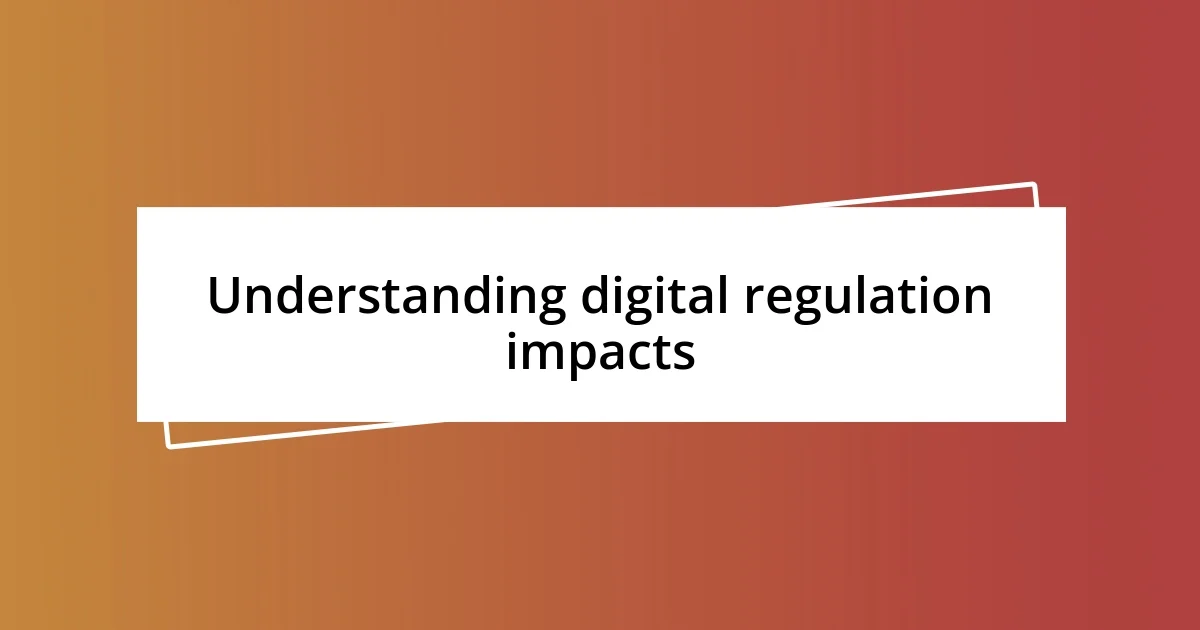
Understanding digital regulation impacts
Digital regulation impacts are multifaceted, and understanding them requires looking beyond the surface. I remember when new data privacy laws came into play; I felt a mix of excitement and apprehension. On one hand, it felt like a step toward more ethics in technology, but on the other, I wondered how companies would adapt. Would innovation stifle under increased scrutiny, or would regulation elevate standards across the board?
As I navigated through those changes, I was struck by how compliance sometimes felt like a heavy weight on smaller businesses. I recall speaking with a friend who runs an online shop; he expressed fear that the cost of compliance would cripple his growth. Isn’t it ironic? Regulations meant to protect consumers can also pose significant challenges for entrepreneurs striving to build something meaningful.
Yet, as I reflected on this, I also realized that digital regulation can spur creativity. Businesses are finding innovative ways to meet compliance requirements, and this often leads to better user experiences. Have you ever considered how constraints can actually fuel innovation? It’s like being put in a box that forces you to think outside of it. In the long run, I believe these regulations could foster a more trustworthy digital landscape, benefiting everyone involved.
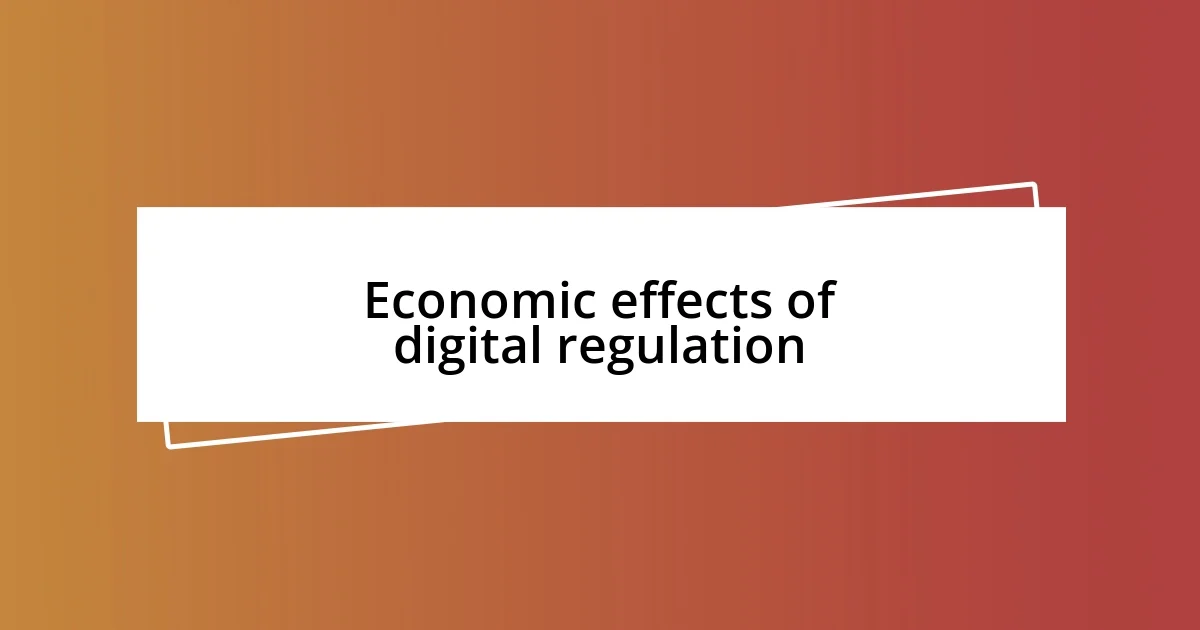
Economic effects of digital regulation
The economic impact of digital regulation is both profound and complex. I’ve noticed that while larger companies often have resources to adapt, small startups struggle significantly under the burden of compliance costs. It reminds me of a local coffee shop that tried to expand its online sales but was quickly overwhelmed by the legal hoops it had to jump through. They had to pick between hiring compliance staff or investing in their product, which is a tough decision for any business owner.
Moreover, I’ve seen how digital regulation can actually create new markets. For instance, businesses specializing in compliance solutions have emerged, providing tools and advice to help companies navigate regulations. I once had a chat with a software developer who pivoted his startup to focus on privacy tools. He shared his excitement about helping others stay compliant while building a thriving business. This adaptability showcases a silver lining in the economic landscape of regulation; it can indeed foster entrepreneurship in unexpected ways.
Finally, the interplay between regulation and innovation often leads to shifts in investment strategies. More cautious investors might pull back on funding tech ventures seen as risky under strict regulations. Conversely, those committed to long-term growth often seek out companies that have embraced compliance. I remember attending an investor meeting where one entrepreneur passionately argued that robust regulatory frameworks could attract healthier investments. It’s fascinating how perceptions of risk and opportunity evolve in response to regulatory environments.
| Economic Effect | Description |
|---|---|
| Compliance Costs | Higher expenses for businesses, especially small ones, in meeting regulatory requirements. |
| Market Creation | New sectors emerge around compliance solutions, fostering innovation and entrepreneurship. |
| Investment Shifts | Changes in investor sentiments can lead to different funding opportunities and challenges. |
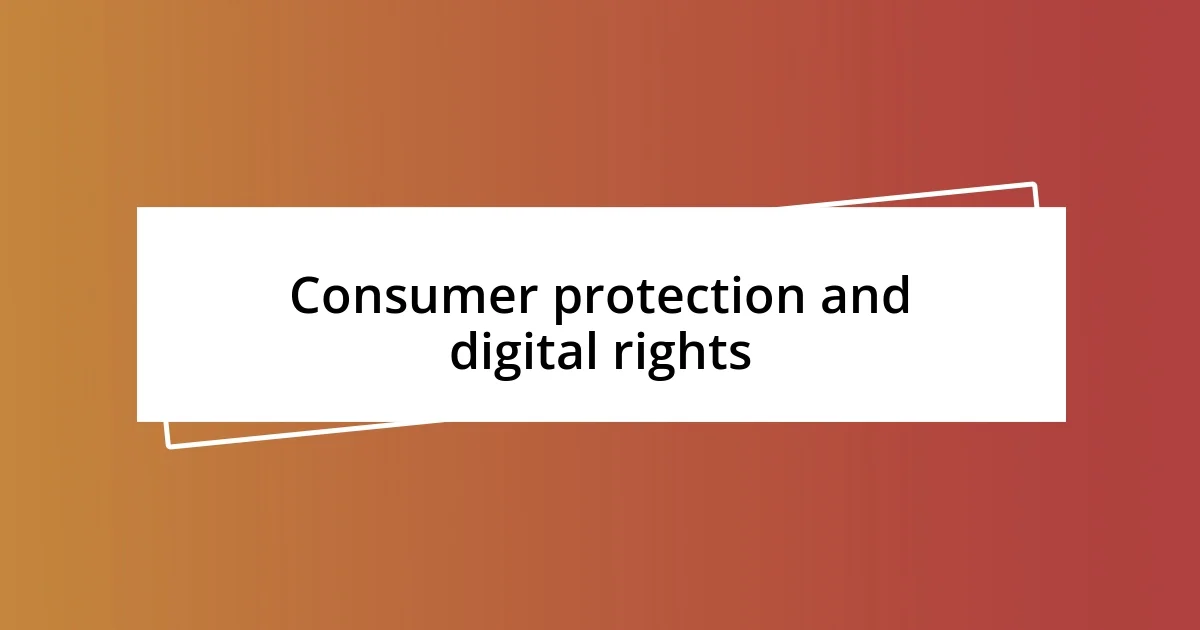
Consumer protection and digital rights
Consumer protection and digital rights are critical areas in today’s tech-driven world. I often think back to a conversation I had with an old colleague who worked in cybersecurity. He was genuinely passionate about the rights of consumers to understand what happens to their data. It struck me how many people use platforms without fully grasping their rights and the implications of the agreements they’re signing. Awareness is essential; if consumers are not informed, they remain vulnerable to exploitation.
I believe that consumer protection regulations should empower individuals and build their trust in digital platforms. Here’s why this matter resonates so deeply with me:
- Transparency: Consumers deserve clear information about data usage and privacy policies.
- Accessibility: Regulations should ensure that rights are easily understandable, avoiding complex legal jargon.
- Accountability: Companies must be held responsible for breaches, fostering a sense of safety among users.
- Empowerment: I’ve seen many individuals take action, like opting out of tracking features, once they understand their rights.
When talking about digital rights, I can’t help but recall a seminar I attended focusing on digital literacy. It was encouraging to see attendees eager to learn about their protections. The excitement in the room reminded me that who we are online is just as important as how we engage offline. Empowering consumers with knowledge and more robust protections ultimately enhances their overall digital experiences.

Challenges faced by businesses
Navigating the landscape of digital regulation can feel like running a marathon for many businesses, especially those with limited resources. I recall a friend’s startup that faced a daunting compliance challenge; they spent countless hours and dollars just to understand the new regulations before they could even launch. This kind of pressure can stifle creativity and innovation, making it hard for passionate entrepreneurs to truly thrive.
Small businesses often grapple with the complexity of varying regulations across different jurisdictions. I once attended a workshop where a local shop owner shared her frustrations about needing to adapt her website for compliance in multiple states. It made me ponder: how can a local retailer possibly keep up with such a fast-paced regulatory environment? For many, the result is a sense of paralysis, where they feel they can’t expand or innovate without stepping into a regulatory quagmire.
Finally, there’s the ever-present fear of penalties that looms over business owners. I remember a conversation with a marketing director who expressed anxiety over potential fines related to data breaches. The weight of this burden not only impacts day-to-day operations but can also lead to an overall loss of motivation. When compliant practices become more of a checklist than a pathway to growth, the joy of entrepreneurship can quickly fade. How can we encourage a focus on innovation while still adhering to necessary regulations? It’s a balancing act that many in the business world struggle to maintain.
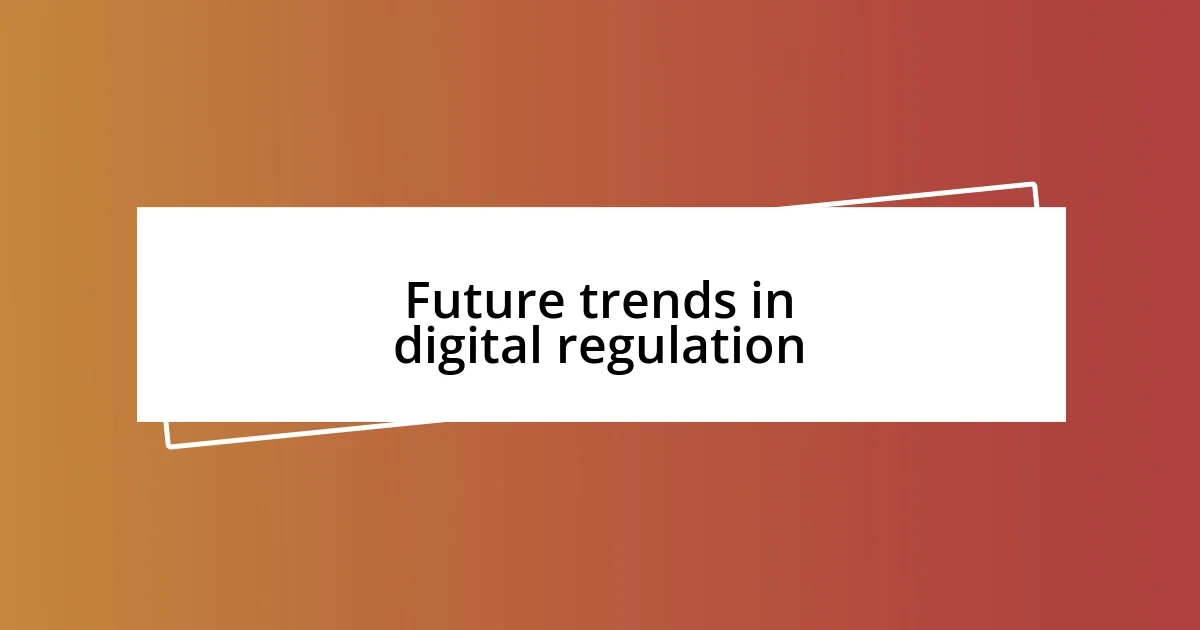
Future trends in digital regulation
As I look ahead, I can’t help but feel that digital regulation is on the brink of a significant evolution, particularly concerning artificial intelligence (AI). I’ve read about how governments are beginning to scrutinize AI technologies more closely, and honestly, it makes me think about the ethical implications of these tools. For instance, when I last tested a chatbot, I wondered: how do we ensure that these systems treat users fairly and transparently? It’s crucial that as regulations advance, they address the unique concerns surrounding AI, such as bias and accountability.
The focus on data privacy isn’t going away; rather, it’s going to intensify. I remember a discussion with a data analyst who shared insights on the upcoming privacy laws being introduced. His enthusiasm about data minimization—from collecting only what’s necessary—really struck a chord with me. It feels like these regulations will push companies to rethink their data strategies and prioritize user rights over profit. What might this mean for businesses that have relied heavily on extensive data collection? It opens an avenue for companies to innovate responsibly and build lasting trust with their customers.
Moreover, the role of global cooperation is becoming increasingly vital. I had a thought-provoking conversation with an international lawyer who highlighted the challenges of differing regulations across borders. It made me realize that the future may require a more unified approach to digital regulation. Could we see a worldwide framework evolving, making compliance easier for businesses operating internationally? I believe fostering collaboration among nations could lead to better regulation while protecting digital rights. This is undoubtedly a complex path, but it’s essential for ensuring a fair digital landscape for everyone.
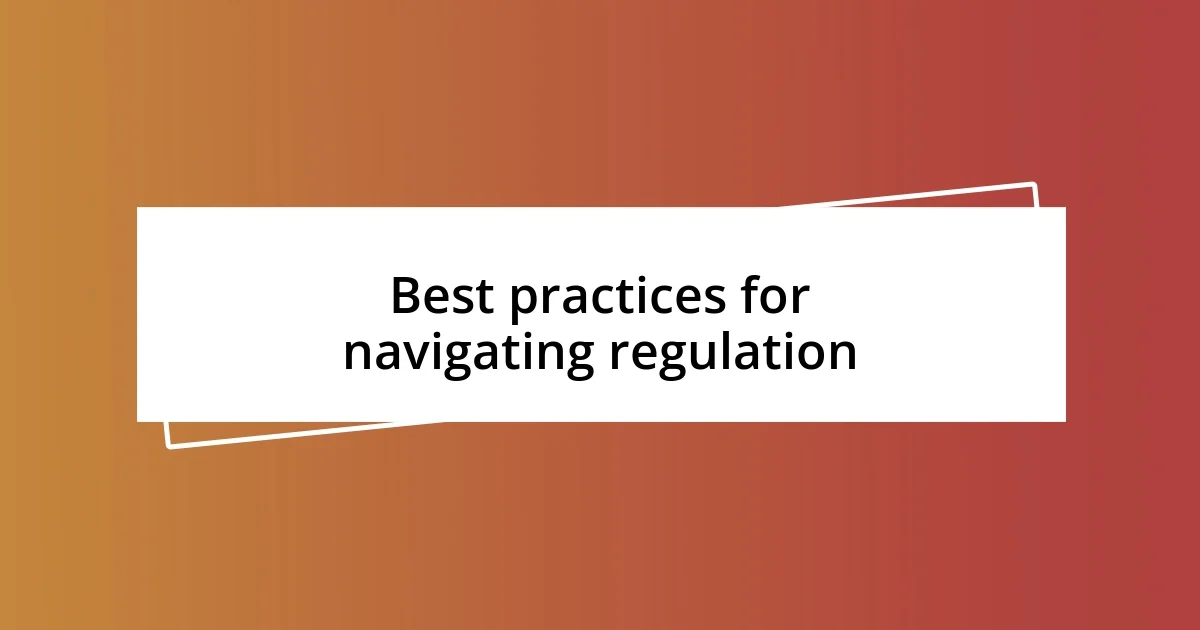
Best practices for navigating regulation
One effective strategy for navigating digital regulations is to stay informed and proactive. I remember the look of relief on a colleague’s face when he subscribed to newsletters that specifically focused on regulatory changes in our industry. It’s amazing how much a little knowledge can empower you to make timely adjustments before obstacles arise. Have you ever considered how regularly checking in with industry groups could save your business from costly missteps?
Building relationships with regulatory agencies is another best practice I’ve found invaluable. I once had a coffee chat with a local regulator, who provided insights that transformed my understanding of compliance. This informal dialogue opened doors to understanding not just the “what,” but also the “why” behind regulations. Isn’t it fascinating how a simple conversation can demystify complex regulations and foster a more constructive relationship?
Lastly, I believe that leveraging technology can be a game-changer. When I advised a startup on implementing robust compliance software, their anxiety around penalties significantly diminished. This tool not only streamlined their processes but also boosted their confidence in navigating the regulatory landscape. Have you considered how technology could enhance your compliance efforts and allow you to focus on growth? Embracing these practices can truly make a difference.













